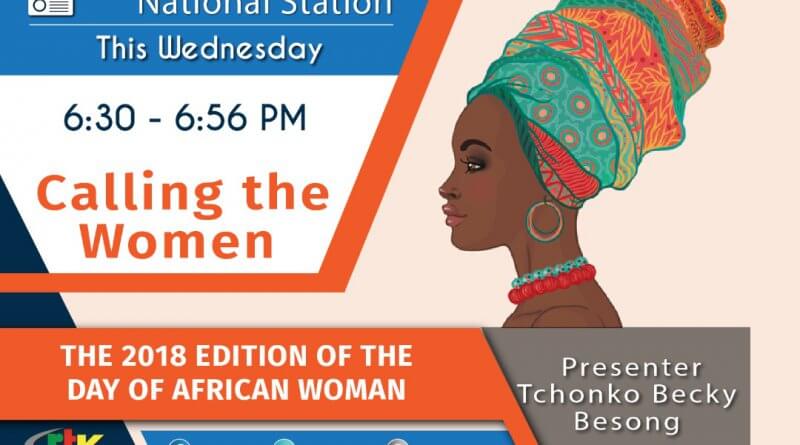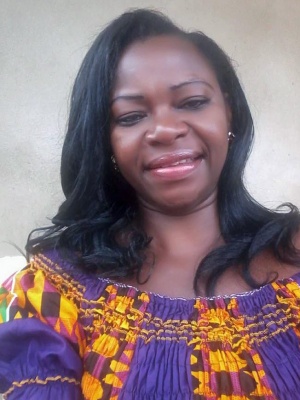Knowledge is Power for Girls & Women
Manager
Radio producer
Yaoundé, Cameroon
Name of job: Unit head in charge of Quality Control of Radio Programmes, Cameroon Radio Television Corporation (CRTV).
What type of projects do you do? Currently, I am Unit head in charge of quality control of packaged and live programmes on the national station of the CRTV. I produce and co-produce a handful of radio programmes to raise awareness on the health needs and education rights of girls and women, not to forget the specific needs of persons living with disabilities. So I work on media campaigns to reduce the prevalence of HIV/AIDS among girls and women and programmes to end gender based violence and discrimination. I showcase role models, work on women’s entrepreneurship, the promotion of female leadership, especially political leadership and promote gender equality in all spheres of live.
Why did this sort work interest you, and how did you get started?
Actually, I am in my 20th year of a full and exciting career as a journalist and gender advocate, working for the protection and promotion of the human rights of women and girls. Growing up as a girl who was raised by a single parent – my mother, I faced many challenges, some of which I have never breathed a word about to anyone. But thanks to the education I received, today I take it as a responsibility to empower girls and women, across Cameroon and beyond, with information, for I have come to understand that KNOWLEDGE IS POWER. So after my graduation from the school of journalism (a dream come true), I pledged to contribute to make even one girl live better than my girlhood days and so that even one women somewhere in Cameroon will live a more fulfilled life than my mother had.
What part of this job do you personally find most satisfying? Most challenging?
It is very rewarding when people walk up to you after church, in a social gathering, or just send you a text message saying: “I listened to your programme the other day and it was very edifying”; or better still, “… henceforth I know how to behave to avoid harassment from male colleagues”; this is telling that one’s work is making some impact and of course is a booster to persist along the same lines.
But the greatest challenge is to get women share their stories, for instance, stories of years of battering, or from victims of female genital mutilation and other gender based violence, like widowhood rights or sexual abuse, who refuse to speak out for fear of being stigmatized. Often some women who have acquired some skills and are looked upon as models, survivors and leaders, always ask for monetary compensation to grant interviews or speak on TV and radio programmes. Also, due to ignorance, there is still the category of those who think that all the talk about women’s rights and gender equality is a desecration of traditional values. Despite such challenges, we are encouraged by the feedback we get.
What do you like and not like about working in this industry?
Today, I enjoy the fact that there is an increasing number of young, talented women in the media who are more aware about the issues at stake and are determined to make their contribution in mainstreaming gender through the media and to other domains of public and family life. Yet one remains dumbfounded at the indifference of male colleagues who continue to act as if gender equally is just for the airwaves. This observation confirms the fact that though there is a conscious effort to treat women and girls with dignity, a lot remains to be done and we can begin by involving men in the media as actors in the promotion of gender equality.
My strongest assets/skills, areas of knowledge, personality traits and values are….
I am of a cheerful disposition and prone the respect of elders and others. I have a mastery in programme packaging, skills in public speaking and in soul music. My strongest asset is that I easily connect with people and create valuable relationships.
Has IAWRT’s network of media women around the world helped or inspired you?
It is true that I have not really been keen on what other IAWRT chapters have been doing up to now but since my nomination as chapter head for Cameroon, I am making time to, from time to time, check online for news about other chapters. I must say, I marveled at the stance of Tunisian women to speak out against GBV, as well as the recent publication of “WHAT IF…? The Safety Handbook for women journalists”. I do not forget the workshop for rural women organized by IAWRT Kenya. All these are quite interesting and educative.
 What are your long-term goals?
What are your long-term goals?
My long term goals include owning a TV and radio production unit that will produce programmes that will continue to promote the right s of women, assert their dignity and wipe out stereotypes. I also intend to continue grooming young women in the media to be conscious about gender sensitive reporting, in content, pictures, images, etc.
What special advice do you have for young women seeking to qualify for this type of work?
I do not miss any occasion to tell young women that knowledge is power and that humility, hard work and dignity are more precious that instant material gain. My advice to young women is that they should avoid wasting time on trivialities, learn to minimize their differences and work together for the common good.
Do you have any special words of warning, or encouragement, because of your experience?
Beware of easy wealth for anything that you do not work for, you may have to earn by risking your life.
links to some of your work which is available online
you can find a few samples of my radio magazine programmes on Sound cloud: Becky Bissong
Facebook: Becky Bissong and MEWIC CAMEROON
(I am married to Tchonko, so am better known as Tchonko Becky Bissong)








